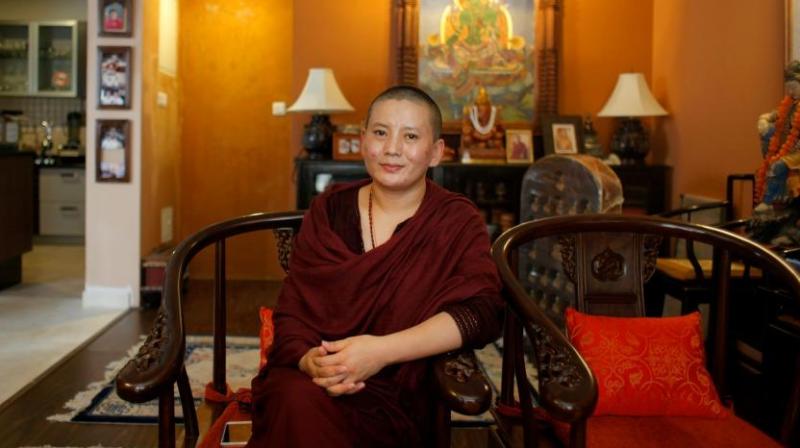Video: Nepal's most popular Buddhist nun is actually a rockstar
Ani Choying Drolma is famous as one of the country's biggest pop stars.

There is one Buddhist nun everyone in Nepal knows by name — not because she's a religious icon and a UNICEF goodwill ambassador, nor for her work running a girl's school and a hospital for kidney patients.
Ani Choying Drolma is famous as one of the country's biggest pop stars.
With more than 12 albums of melodious Nepali tunes and Tibetan hymns that highlight themes of peace and harmony, the songstress in saffron robes has won hearts across the Himalayan nation and abroad.
"I am totally against the conservative, conventional idea of a Buddhist nun," the 45-year-old nun said. Some people "think a Buddhist nun should be someone who does not come out in the media so much, who is isolated ... always in a monastery, always shy. But I don't believe in that."
Neither do her fans, who greet her with a roar of applause whenever she walks out on stage, and fall silent as she closes her eyes to sing.
"Every time I get frustrated with life or get angry, I just listen to Ani's music and I calm down," said one fan, Sunil Tuladhar. "She is my music goddess."
But with a career deviating sharply from what conservatives in Nepal believe to be the proper path of a Buddhist, she's caught criticism as well. One Buddhist monk at the famed Swayambhu Shrine questioned how she can reconcile the simple life of a religious ascetic with the fame and wealth she's amassed over her two-decade musical career.
"How can a nun be making money by selling her voice, living a luxurious life and yet claim she is a nun?" Surya Shakya asked.
Despite her fame, Drolma looks every bit the typical Nepalese Buddhist nun, with her hair shaved short and an ever-present smile. She travels the world giving concerts in countries including the United States, Brazil, China and India.
Popular composer Nhyoo Bajracharya, who has worked with Drolma, describes her music as a fusion of traditional Tibetan and Nepali styles. "They are religious songs, slow rock with flavors of blues and jazz combined," he said.
But Drolma believes her singing goes beyond delivering a catchy tune. Her 2004 hit "Phoolko Aankhama," which means "Eyes of the Flower" in the Nepali language, features lyrics that touch on religious teachings: "May my heart always be pure/May my words be always word of wisdom/May the sole of my feet never kill an insect."
Her singing offers listeners a way to practice meditation and "is about invoking a spiritual quality," she said in a recent interview with the Associated Press. "That is what I rejoice in."
She refused to say how much money she has earned from album sales and concerts, but said she donates much of it to education charities through her Nun's Welfare Foundation and runs a kidney hospital.
Click here to watch

